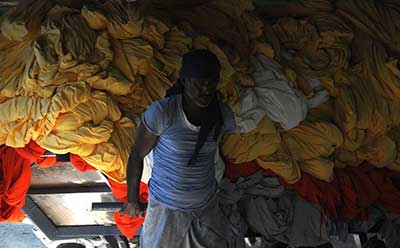Date: 07/12/2022
Relevance: GS-3 : Indian Economy and issues, Inclusive growth and issues arising from it, Conservation, environmental pollution and degradation, environmental impact assessment.
Key Phrases: Textile Industry, Technical Textile, Apparel Sector of India, Unsustainability of Textile Industry, Traceability, Recycling of Textile of Waste, Circularity.
Context:
- The textile industry is coming under greater Environmental, social and governance (ESG) scrutiny.
- Traceability in supply chain and recycling of textile waste are vital going forward.
Key Highlights:
- Globally, awareness about consuming ‘green’, ‘natural’, ‘biodegradable’, ‘sustainable’ products has been rising.
- This is so especially after the United Nations in 2015 announced as many as 17 Sustainable Development Goals to be achieved by 2030.
- To attract customer attention, many companies have started to claim that their products are sustainably produced.
- High-end branded products covering a range of consumer goods from premium foods to personal care products claim to follow sustainability principles and responsible sourcing.
- However, companies are under greater scrutiny about their sustainability claims these days. This is a challenge they will have to face and overcome.
- Changing behaviour among environmentally conscious and socially aware consumers is seen putting pressure on top-end brands.
Textile Industry in India:
- Economic Value of Textile Industry in India.
- The Indian textile and apparel market is currently estimated at over $150 billion, of which, export constitutes over $40 billion.
- A recent report pointed out that the global textile and apparel trade is set to reach $1,000 billion by 2025-26 and that in the same period the Indian textile and apparel market will reach $250 billion.
- India holds a 4% share of the U.S.$840 billion global textile and apparel market, and is in fifth position.
- It contributes 2.3% to Indian Gross Domestic Product, 7% of Industrial Output, 12% to the export earnings of India and employs more than 21% of total employment.
- India is also the second largest producer of silk in the world and 95% of the world’s hand woven fabric comes from India.
- India is the 6th largest producer of Technical Textiles with
6% Global Share, largest producer of cotton & jute in the world.
- Technical textiles are functional fabrics that have applications across various industries including automobiles, civil engineering and construction, agriculture, healthcare, industrial safety, personal protection etc.
- Admittedly, the per capita availability and consumption of textiles in India is far less than in advanced economies
- But demand is surely on the rise with rising disposable incomes and demographic pressure.
Significance
- In India, the textile and apparel industry is a critical and integral part of the manufacturing sector.
- The industry is a major income and employment generator.
- It is also a massive foreign exchange earner through the export route.
- From ‘Till to Textiles’, the chain is long with several intermediaries.
Unsustainability of Textile Industry:
- The textile industry is primarily concerned with the design, production and distribution of yarn, cloth and clothing.
- The raw material may be natural, or synthetic using products of the chemical industry.
- The textile industry consumes huge quantities of resources such as water, energy and chemicals.
- Indiscriminate use of these poses a threat to sustainability.
- Every year, millions of tonnes of clothes are manufactured, worn and discarded.
- Globally, the textile industry is known as a big polluter because of its greenhouse gas (GHG) emissions.
- Textile and apparel effluents account for 17%-20% of all water pollution.
Making Textile Industry Sustainable:
- To overcome the environmental and social scrutiny, the textile industry needs to minimise pollution and help advance sustainability.
- Tracebility
- It is the ability to track and trace the whole life-cycle of textile products — from raw material and final goods to consumption, disposal and recycling, if done.
- Traceability in supply chain will enhance the industry’s efficiency.
- It can ensure steady supplies of consistent quality material, help identify and address disruption as well as allow better risk management.
- Circularity
- From a sustainability perspective, circularity is critical.
- Recycling will help reduce GHG emissions, save resources and help maximise overall economic, social and environmental benefits.
- It is important that we give textiles and clothing a second life.
- We have to reuse them, repurpose them. Otherwise, they will end up as landfill as happens in advanced economies.
- China has a policy to recycle textile waste. The European Union has a Waste Directive Framework. But India does not have a policy as yet.
Way Forward:
- India needs to frame a suitable policy whereby the Indian textile industry can contribute to advancing our energy transition commitment.
- To achieve the sustainable target, it is necessary to adopt good regulatory practices and increased focus on quality, compliance and investment.
- As part of this, we need policies to encourage recycling of discarded textiles.
- This is important given the socio-economic status of the country and income disparities.
- Recently, Bangladesh’s readymade garments initiated ‘green manufacturing’ practices to help conserve energy, water, and resources. India could bring such initiative into action to combat unsustainibilty of textile industry.
Conclusion:
- Sustainable practices such as regenerative organic farming (that focuses on soil health, animal welfare, and social fairness), sustainable manufacturing energy (renewable sources of energy are used) and circularity are needed to be adopted to make textile industry sustainable.
- The Indian government is committed to promoting sustainability through project sustainable resolution.
Source: BusinessLine
Mains Question
Q- “Traceability in the supply chain and recycling of textile waste are vital going forward”. Discuss (150 Words)









